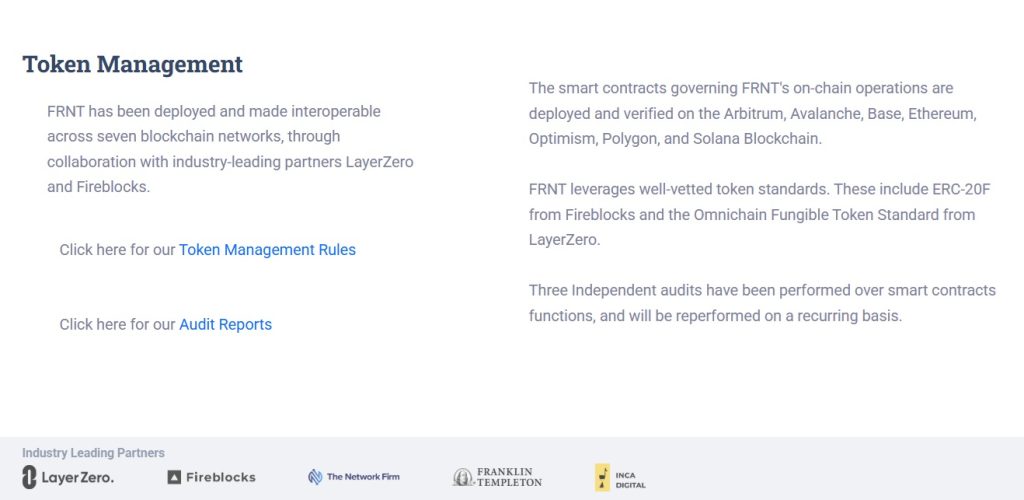It’s going to be a very big step forward for the cryptocurrency industry as well as for the state of Wyoming. Soon the first U.S.-dollar backed stablecoin will finally be released to the general public by the Wyoming Stable Token Commission or WYST. This follows the latest consultation period that ended on November 6, 2025, where members of the public could write in with their feedback and concerns.
FRNT, the Frontier Stable Token, was created under the Wyoming Stable Token Act of 2023, as the first U.S. state-issued stable token. WYST is the governing entity, while FRNT is the product it created. Just like Wyoming is the Frontier State, FRNT is positioned as a “frontier” in public-sector innovation. The first U.S. state-issued stablecoin, backed by cash and short-term U.S. Treasuries.
Governor Mark Gordon and Senator Cynthia Lummis headlined the second invite-only Wyoming Blockchain Symposium in August 2025. The Governor, who also serves as the Chairman of the Wyoming Stable Token Commission (WYST), used the event to release breaking news about FRNT. He stated how “today, Wyoming reaffirms its commitment to financial innovation and consumer protection. The mainnet launch of the Frontier Stable Token will empower our citizens and businesses with a modern, efficient, and secure means of transacting in the digital age.”
The Governor added how the token would be made available in the coming days. However, as of today the token is not available for sale to the public.
There are several companies providing the infrastructure that is needed for the new stable token. These include LayerZero, Fireblocks, The Network Firm, Franklin Templeton’s Franklin Advisers, and Inca Digital.

The Wyoming Stable Token Ecosystem
The Network Firm provides attestation services for stablecoin issuers. This includes complete examinations and agreed-upon procedures (AUP) with crypto-specific criteria and procedures for custom purposes. The company is already helping organizations like Kraken with similar services.
LayerZero is a technology that enables applications to move data across blockchains. The company posted on LinkedIn two months ago how the new Wyoming stable token, or FRNT, is “built as a LayerZero OFT (Omnichain Fungible Token) which enables it to work across all blockchains simultaneously. It means that FRNT can configure its own security, and allows it to operate on multiple blockchains natively, without relying on third-party solutions for ‘wrapped’ versions for each chain.”
FireBlocks streamlines stablecoin payments, settlement, custody, tokenization, and trading operations enabling institutional and retail experiences across the largest ecosystem of banks, payment providers, stablecoin issuers, exchanges and custodians. The firm works with BNY, Revolut and many other organizations. Fireblocks stands ready to provide the secure token infrastructure needed to support FRNT, whether that be treasury, disbursements, or cross-border settlement.
Inca Digital provides risk-focused intelligence for crypto and banking. The company will deliver the Wyoming Stable Token Commission advanced analytics, cross-market oversight, and threat detection. This will bolster the Commission’s ability to monitor and mitigate risks related to fraud, money laundering, and market anomalies, ensuring the safety and integrity of the token for its users.
Franklin Templeton has recently started to become a major player in the crypto space. Current President and CEO Jenny Johnson was at the Wyoming Blockchain Symposium in Jackson Hole, Wyoming in 2024 where she highlighted the firms ambitions in blockchain and artificial intelligence. Franklin Advisers, a division of Franklin Templeton, will provide reserves management for FRNT.
Wyoming’s First Mover Advantage
North Dakota may be the second state to issue a stablecoin (called Roughrider), but Wyoming was the first state. This gives the Frontier State first mover advantage. FRNT is the first fully reserved, fiat-backed stablecoin issued by a U.S. state. It may be perceived by some as being a superior product to existing stablecoins like USDC or USDT. Others raise questions about governance and the adoption of the token.
FRNT was enabled by the Wyoming Stable Token Act of 2023. Importantly, some see it as being exempt from the GENIUS Act. Something that may raise eyebrows, as well as invite lots of discussion mentioning the word ‘loophole.’ Ultimately the token was already in process when the GENIUS Act came into effect. Importantly, the GENIUS Act definition appears to exempt state governments from the federal oversight governing private stablecoin issuers.
The Frontier Token has some critics. One of the most vocal critics has been the GOP Majority Whip Rep. Tom Emmer who is “vehemently against” the project. Others submitted their comments to the Committee before the November deadline. Several of them were read out during the regular meeting of the Wyoming Stable Token Commission last Thursday, November 20.
Anthony Apollo, the Executive Director of the Commission and project lead for the stable token shared some important points during the meeting. One of those was how the token was “well positioned to serve global remittance use cases as a global technology.”
Can the Frontier Stable Token Fulfil its Promise?
FRNT will need to be a global technology, especially as the population of Wyoming in 2024 was 587,618 according to the U.S. Census Bureau. There may be some use cases that local citizens might be able to leverage, but the cost of the Commission and the token’s vendors needs to be accommodated within the biennial running costs of over $5 million. Not to mention the Commission’s desire to fund the Wyoming’s School Foundation Fund.
To maintain an income level of $10 million in interest from Franklin Templeton’s tokenized money market funds you need to consider that today 3-year U.S. Treasury yield is about 3.5 percent. Bearing in mind that FRNT is holding $1.02 against $1 it mints, this would mean that there would need to be over $280 million FRNT in circulation for WYST to generate the required $10 million needed to fund itself and local Wyoming schools. It would also be useful if consumers held the token on their account for a few days, rather than just using it for payments. With no interest offered, holding FRNT will be less popular than using a deposit account.
Should interest rates drop… then the circulation number would need to rise dramatically.
$280 million might not seem like much compared to the $184 billion of Tether’s USDT in circulation (DefiLlama), but it all depends on how the public perceives FRNT.
Do Americans Trust Government Institutions?
Where most Western countries are seeing bank closures due to the adoption of digital payments, cash is still king in the U.S. today. Part of the reason for this is the distrust of government institutions amongst U.S. citizens. In a survey conducted by the Partnership for Public Service in the spring of 2025, trust in the federal government remains low. Only 33 percent of Americans trust the government, while 47 percent do not and 13 percent are neutral.
To give FRNT a chance to be distanced from state or government money, in February 2025, the Governor of Wyoming signed a bill prohibiting central bank digital currencies in Wyoming.
Additionally, the dislike of card payment providers is more because of the fees they charge. In Wyoming today, many consumers still use checks to pay their bills, in order to avoid card fees. In fact, although the practice has greatly declined, checks are still being used by 47 percent of midsize businesses in the U.S. today. Can FRNT change this trend?
Is FRNT more than a Dream?
Last week David Pope, who serves on the Wyoming Select Committee on Blockchain and the Wyoming Stable Token Commission, recognized Apollo’s work. It was Pope’s belief that in November 2025 the first attestation report on a state stable token ever in the world took place. Another achievement to add to the list of Wyoming firsts, he highlighted.
If FRNT really is a state token, and consumers in the U.S. recognize this, then adoption may prove more challenging than Apollo and his team have planned for. If the international product that Apollo is dreaming of can become a reality, then there may be a chance for FRNT to really succeed.
Author: Andy Samu
#FRNT #WYST #Stablecoin #CBDC #Wyoming #Adoption #Trust #Ecosystem
See Also:
From Fireblocks to Stablecoins | Disruption Banking
Who is Cynthia Lummis? The Wyoming Senator Pushing For a U.S. Bitcoin Reserve | Disruption Banking














